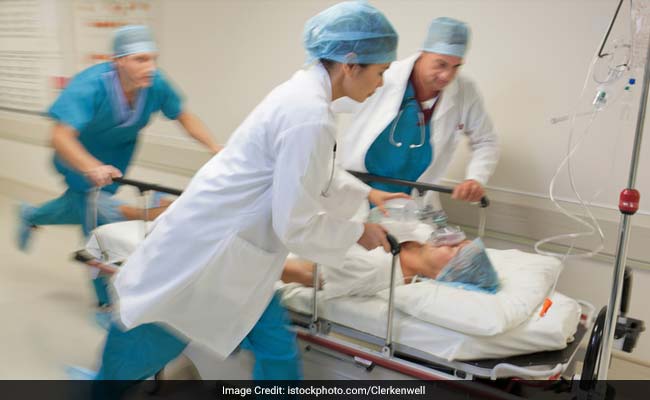TIME is of paramount importance in all walks of our life. In case of our heart, it becomes even more significant as it is a matter of life and death. On the very first day of my training in cardiology, I was made to recite the phrase: "Time is myocardium". We as cardiologists, are told to imbibe and follow this dictum for the rest of our lives. We are also told to stay close to the hospital, so that when a patient is in need, the treatment isn't delayed.

If someone has had a heart attack, its important to rest while they wait for an ambulance.
Subject: Need some medicines
"Hi Doc, sorry to bother you so late, but after dinner I started having pain in my chest. I finished eating around 9 pm and half an hour later the pain started. It hurt badly. My chest felt heavy as if an elephant was sitting on me. I thought, it was due to the heavy dinner I ate and took some antacid but it did not help. Mrs. Kapoor suggested I take the pain killer that I consume for my back. It couldn't sustain for more than half an hour. I feel tired and my shoulders and jaws have also started aching. I tried to sleep but have been feeling very anxious and troubled since that time. I didn't want to trouble you at this hour but sending this mail on Mrs. Kapoor's insistence. Could you suggest some medicines before I drop in to your hospital!"
My friend Mr. Kapoor was having a heart attack and he was making one of the biggest mistakes that patients make - waiting to be evaluated. How could you avoid being another Mr. Kapoor?
TIME is of paramount importance in all walks of our life. In case of our heart, it becomes even more significant as it is a matter of life and death. On the very first day of my training in cardiology, I was made to recite the phrase: "Time is myocardium". We as cardiologists, are told to imbibe and follow this dictum for the rest of our lives. We are also told to stay close to the hospital, so that when a patient is in need, the treatment isn't delayed.
Let's understand the following points elaborately -
- Myocardial infarction (MI), commonly known as heart attack occurs when blood flow stops to a part of the heart causing damage to the heart muscle.
- According to the WHO, approximately, one in three deaths in India are caused because of cardiovascular disease. The incidence and prevalence of heart disease is increasing, and this is especially true in the young.

Heart attacks need immediate attention
Photo Credit: iStock
What happens in a heart attack?
- The heart muscle - myocardium is responsible for the pumping action of the heart, which serves to distribute blood throughout the body. In a heart attack, called a myocardial infarction, artery-carrying blood to a part of the heart, called the coronary arteries, gets narrowed or totally occluded. This causes a lack of oxygen and essential nutrients to the part of the heart that is supplied by the artery, a condition called ischemia.
- The patient complaints of pain or other symptoms (hyperlink to the article). This is confirmed by an ECG or blood test. Lack of blood supply builds up and can cause the tissue to start dying, called infarction. Death of the heart muscle disrupts blood circulation severely. Chances of recovery become lower with every passing minute hence the term "Time is Muscle". A delay in treatment can cause irreversible muscle damager and can often be fatal.
- This is especially applicable in a patient who has chest pain and ECG changes consistent with an occluded artery, a condition called "ST elevation Myocardial Infarction".
- It has been proved in multiple clinical trials, that rapid restoration of blood flow to the heart decreases damage to the heart muscle. This improves patient outcomes including survival. The reperfusion can be achieved by medicines or preferably by coronary angioplasty.
- This introduced the concept of "Door to Balloon time", commonly called D2B. Most hospitals across the world strive to achieve a D2B time of 90 minutes. This means, that from the time the patient reaches the hospital to the time, the artery is opened is less than 90 minutes.
- In recent years, door to balloon time has become an important metric of doctors who want to improve emergency care for heart attack patients.
- When coronary angiography is not an option, strong "clot busting medicines" like streptokinase, reteplase or tenectaplase can also be used. The goal is to deliver such therapies within 30 minutes of reaching the hospital. This is called "Door to Needle" time.
- A person experiencing a heart attack may not even be sure of what is happening. A person who has had a previous heart attack may have different symptoms in a subsequent heart attack. Hence, knowing the early warning signs of heart attack is critical for prompt recognition and timely treatment.
Call up your family doctor at once or visit the nearby hospital. If someone has had a heart attack, it's important to rest while they wait for an ambulance - to avoid unnecessary strain. An aspirin helps to thin the blood and restore the heart's blood supply. Timely consultation helps avoid complications and makes life simpler. Mr. Kapoor who suffered an attack two months ago, is back to his hectic job helping people deal with the unpredictable stock market. All thanks to timely medication and health care. Why take chances? After all, the greatest wealth is health and a healthy heart is surely in our hands!
(Dr Sameer Gupta FACC, FSCAI is an Interventional Cardiologist at the Metro Hospital in Noida and Umkal Hospital in Gurgaon. He hosts a weekly health awareness program on NDTV 24x7, 'Doctors on Call'.)
Disclaimer: This content including advice provides generic information only. It is in no way a substitute for qualified medical opinion. Always consult a specialist or your own doctor for more information. NDTV does not claim responsibility for this information.
DoctorNDTV is the one stop site for all your health needs providing the most credible health information, health news and tips with expert advice on healthy living, diet plans, informative videos etc. You can get the most relevant and accurate info you need about health problems like diabetes, cancer, pregnancy, HIV and AIDS, weight loss and many other lifestyle diseases. We have a panel of over 350 experts who help us develop content by giving their valuable inputs and bringing to us the latest in the world of healthcare.














